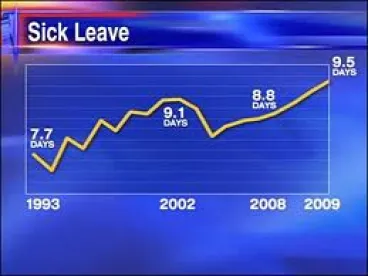On July 1, 2011, Connecticut Governor Dannel P. Malloy signed into law Public Act No. 11-52 (the “Act”) which will make Connecticut the first state to mandate paid sick leave. The Act, which only narrowly passed through Connecticut’s Senate (18-17) and House of Representatives (76-65), is set to take effect on January 1, 2012, and requires employers to allow their “service workers” to earn one hour of paid sick leave for every 40 hours worked, capped at a maximum of 40 hours per year.
Covered Employers
The Act applies to the “service workers” of employers with 50 or more employees in Connecticut during any single quarter in the previous year. Certain manufacturers and nationally chartered nonprofit organizations are exempt from the Act’s requirements, however, it is estimated that 200,000 to 300,000 workers will be eligible for the paid leave.
The Act defines “service worker” as an hourly or non-exempt employee who is primarily engaged in one of 68 occupations including: Food Service Manager, Medical and Health Services Manager, Librarian, Pharmacist, Physician Assistant, Registered Nurse, Home Health Aide, Nursing Aide, Orderly and Attendant, Security Guard, Cook, Food Preparation Worker, Bartender, Fast Food and Counter Worker, Waiter, Waitress, Dishwasher, Host, Hostess, Janitor, Usher, Lobby Attendant, Ticket Taker, Barber, Baggage Porter, Bellhop, Concierge, Cashier, Retail Salesperson, Courier, Secretary, Administrative Assistant, Computer Operator, Data Entry and Information Processing Worker, Bus Driver, Taxi Driver, and Chauffeur. Day laborers and temporary workers are not included within the definition of a “service worker.”
Accrual of Mandated leave
The Act requires employers to annually provide their service workers with paid sick leave. Pursuant to the Act, leave is accrued at a rate of one hour per 40 hours worked, up to a maximum of 40 hours per year. While service workers may carry over up to 40 accrued but unused sick leave hours from one year to the next, they may not use more than 40 sick leave hours per year. Service workers currently employed may begin to accrue sick leave on January 1, 2012, while service workers hired after that date, will accrue leave starting from their first day of employment.
Additionally, service workers are not entitled to payment of unused sick leave upon termination unless an employee policy or collective bargaining agreement provides for such payment.
Use of Mandated leave
Service workers are entitled to use their accrued leave after they have completed 680 hours of employment from January 1, 2012, or if hired after that date, following their completion of 680 hours of work from their date of hire, unless the employer agrees to an earlier date. However, service workers may not use their accrued leave unless they have worked an average of at least 10 hours per week in the most recent calendar quarter.
Taking sick leave entitles service workers to be paid at a rate equal to the greater of their regular hourly wage, or the state minimum wage in effect at the time leave is taken. Service workers may use their sick leave for: (1) a worker’s, or a worker’s child’s or spouse’s injury, illness, health condition, medical diagnosis, medical care, medical treatment or preventative care; or (2) a situation in which a worker is a victim of family violence or a sexual assault, and seeks medical or psychological care, the assistance of a victim services organization, relocation, or to participate in a civil or criminal proceeding resulting from the violence or assault.
Employers who fail to provide paid leave as required by the Act may be subject to civil penalties of up to $100 for each such violation.
Mandated Leave Exemption
Employers who currently provide their employees with at least forty hours of “other paid leave” per year which may be used for sick leave (e.g., paid vacation, paid time off, or personal days), are not required to provide their service workers with additional paid sick leave.
Anti-Retaliation Provision
The Act contains an anti-retaliation provision prohibiting employers from retaliating or discriminating against their service workers, or any other employee, for requesting or using paid sick leave as provided for in the Act, or in the employer’s own sick leave policy, or for filing a complaint with the Labor Commissioner alleging a violation of the Act. Employers found by the Labor Commissioner to have violated this provision will be liable for a $500 civil penalty for each violation. Furthermore, the Labor Commissioner may provide the employee “all appropriate relief” including payment for used paid sick leave, reinstatement, payment of back wages, and reestablishment of employee benefits which the employee would have been eligible for had the employer not discriminated or retaliated against the employee.
Required Notice
At the time of hire, employers must provide a notice to each service worker explaining: (1) their entitlement to paid sick leave; (2) that retaliation for the use, or requested use, of sick leave is prohibited; and (3) that the service worker may file a complaint with the Labor Commissioner for a violation of the Act. Employers can comply with this notice requirement by displaying a poster containing the above information, in both English and Spanish, in a conspicuous place accessible to the employer’s service workers.
Conclusion
Covered employers should review their sick leave policies to ensure compliance with the Act’s requirements as the legislation’s January 1, 2012, effective date approaches. Additionally, employers may also want to prepare a notice or poster complying with the Act’s aforementioned notice requirements.


 />i
/>i

